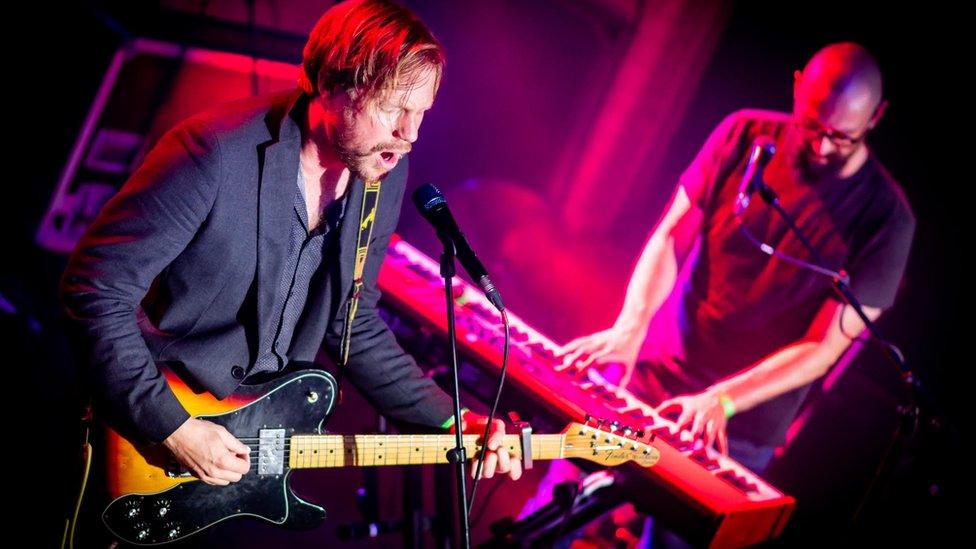Covid in Scotland: Calls for hospitality support after 'bleak Friday'
- Published
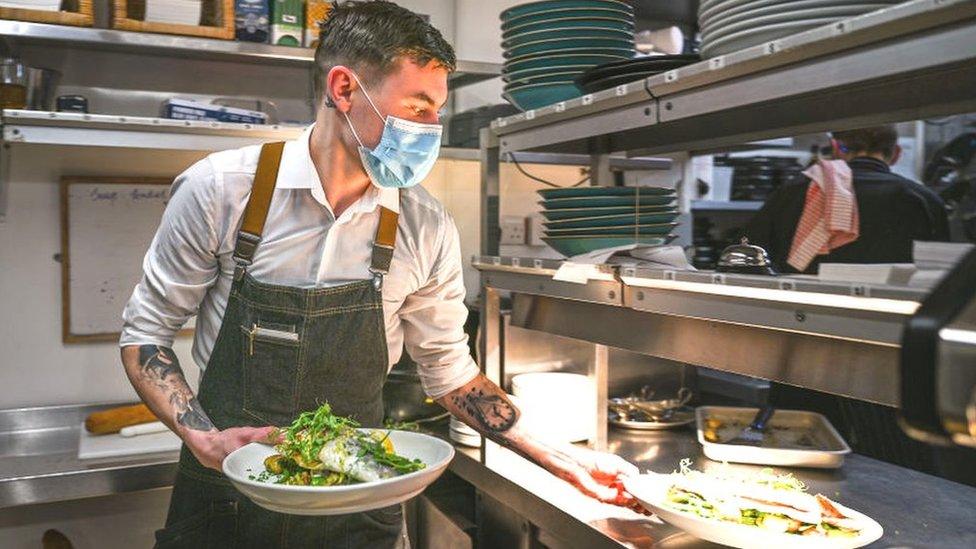
Talks on further support for Scottish businesses are set to take place as firms feel the pinch on what should be their busiest weekend of the year.
The UK government is due to hold a Cobra meeting including leaders of the devolved administrations, who want more money for measures to tackle Omicron.
The Scottish government has already said bars and restaurants will receive a £66m support package.
But hospitality bosses say this would not cover even a few days' losses.
The sum was a share of a £100m package from the Scottish government's budget, which also covered the food and drink supply chain, the cultural sector and the wedding sector.
Stephen Montgomery, of the Scottish Hospitality Group, told the BBC's Good Morning Scotland programme he had visited a number of hospitality venues on Friday night, and there was a noticeable drop in footfall.
He said: "It was a bit unreal, it was quieter than what we'd expect for what would traditionally have been 'black Friday' - which we're calling 'bleak Friday'.
"This is the time of year when we would normally take 30-35% of our annual turnover to see us through January-February time and the last reports we've had in since the Public Health Scotland message came out on Thursday of last week, we're probably seeing a big impound of turnover lost in Scotland through this."
On the £100m funding from the Scottish government, Mr Montgomery said the hospitality industry's share was "a lot short" as they had expected an 80:20 split.
He said: "It wouldn't even cover one or two days of loss of turnover for some people, it certainly wouldn't cover the wages for one week.
"We'll take it, of course we will, but there has got to be some ongoing talks between the UK and Scottish governments - put all political differences aside and get this sorted out."
'Tentative' talks
The Scottish government has made repeated calls for more money from the UK government - a phone call involving Nicola Sturgeon and Boris Johnson took place on Friday.
Earlier this week the Treasury announced £220m of immediate funding, but Scottish ministers say this had been brought forward from next year and had already been budgeted for.
Finance Secretary Kate Forbes told the BBC that "tentative" conversations were being held with the Treasury and she was making the case for funds "on every front".
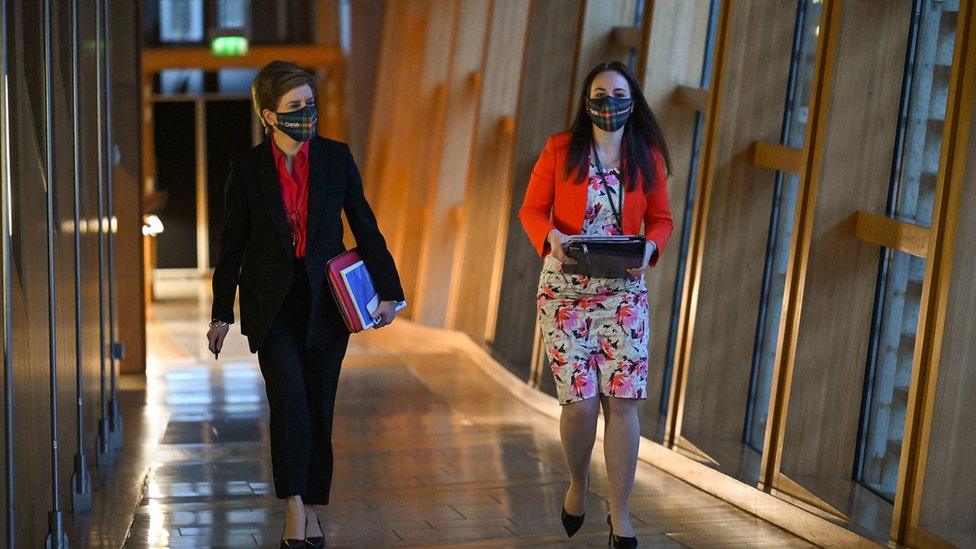
Kate Forbes delivered the Scottish budget earlier this month before £100m was allocated to support businesses hit by the pandemic
Ms Forbes said she has quoted £500m in the Scottish government's request, a figure based on the monthly costs of furlough and grants.
She said: "The UK government can make the substantial funds available almost over night because they access borrowing from the market and ultimately we need the UK government to deliver on the requests made by the Welsh and Scottish governments.
"Ultimately this is about helping businesses right now that are struggling, but also knowing that when we need more support - because none of us can absolutely for definite know how this variant is going to play out - we know that we can access additional support for businesses."
On Friday, the UK government's Chancellor Rishi Sunak met business leaders for crisis talks, as firms warned of lost bookings.
Mr Sunak has said that it is "a difficult time for the hospitality industry" but there were existing support measures in place to help the industry.
'Potential' closures
Dr Christine Tait-Burkhard - an expert in infection and immunity at Edinburgh University - told the BBC that Omicron could be slowed down but not stopped.
She pointed to advice from the UK government's scientific advisory group, Sage, which said if we want to stop the spread we should go back to limiting indoor hospitality and indoor meetings.
She said nightclubs and other large events could be shut down after Christmas to slow the spread.
Nightclubs were closed in Scotland for 16 months at the start of the pandemic and reopened in August.
Dr Tait-Burkhard said: "What we've seen with Omicron is it's very good at spreading in close-contact, large settings… that means certain businesses such as nightclubs are indeed a really good place where the virus can spread easily.
"We have seen Wales closing down nightclubs after Christmas. It is a good potential that that might happen in Scotland as well alongside large events."
Live music venues have already warned they risk permanent closure if no bailout is forthcoming.
On Saturday, 5,917 new cases of Covid were reported - accounting for 12.2% of PCR tests - however, Public Health Scotland said results were being reported more slowly due to the high volume of tests being taken, meaning the true number of Covid cases was likely to be higher.
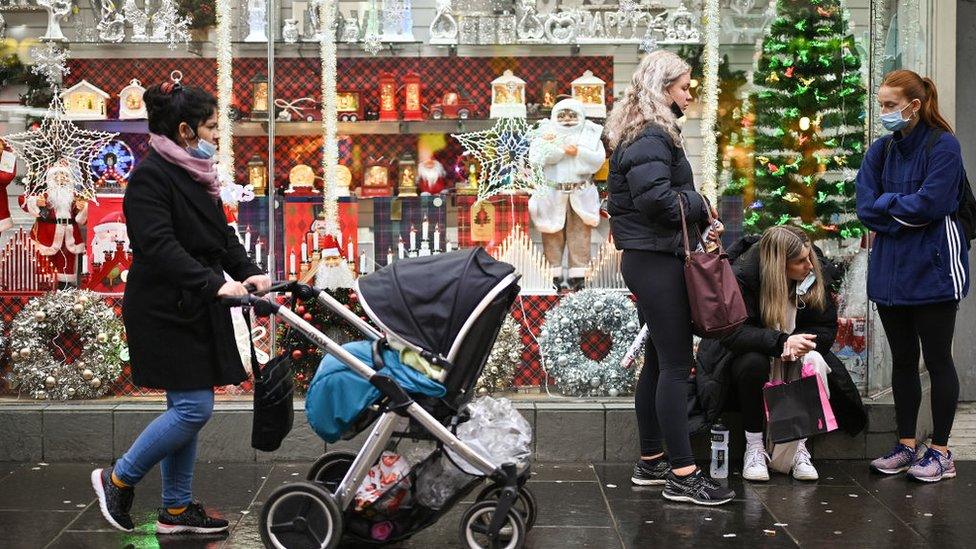
Nicola Sturgeon warned on Friday that Omicron was now the dominant strain of the virus and a "tsunami" was beginning to hit Scotland.
New guidance for shops, hospitality venues and other businesses was introduced on Friday, in a bid to stem the transmission of Covid.
David Lonsdale, director of the Scottish Retail Consortium, said there were "early and worrying indications to suggest shopper footfall has plunged even further in Scotland's city centre locations over recent days" following the first minister's advice for the public to stay at home as much as possible.
He said it was a "crucial" trading time for shops, and that if the further downturn persisted then the government should be prepared to support the retail sector with further financial aid.
"The sector provides 230,000 jobs directly in Scotland and is vital to the health of our high streets and city centres," he added.
On Saturday, Braehead shopping centre in Renfrewshire said the malls had been "busy", with "a stream of socially-distanced shoppers" taking advantage of the last weekend to shop before Christmas.


- Published18 December 2021
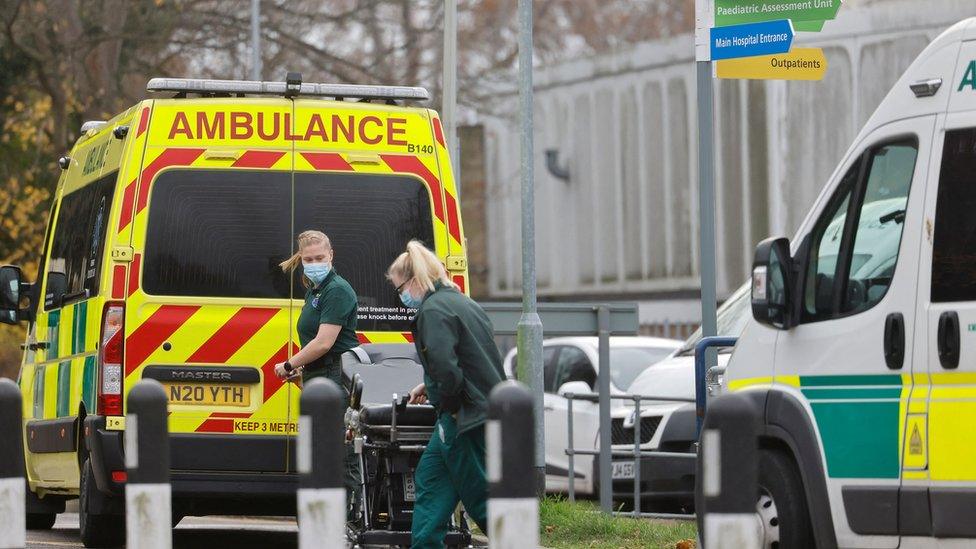
- Published18 December 2021
